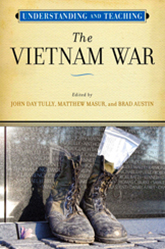|
Understanding and Teaching the Vietnam War
Edited by John Day Tully, Matthew Masur, and Brad Austin
The Harvey Goldberg Series for Understanding and Teaching History
John Day Tully, Matthew Masur, and Brad Austin, Series Editors
Honorable Mention, Franklin Buchanan Prize for Curricular Materials, Association for Asian Studies and the Committee for Teaching About Asia
“This collection makes good on what it sets out to do: help high school and college teachers think about understanding and teaching the Vietnam War in new and innovative ways. There is a clear need for this kind of hands-on volume.”
—Mark Philip Bradley, author of Vietnam at War
Just as the Vietnam War presented the United States with a series of challenges, it presents a unique challenge to teachers at all levels. The war had a deep and lasting impact on American culture, politics, and foreign policy. Still fraught with controversy, this crucial chapter of the American experience is as rich in teachable moments as it is riddled with potential pitfalls—especially for students a generation or more removed from the events themselves.
Addressing this challenge, Understanding and Teaching the Vietnam War offers a wealth of resources for teachers at the secondary and university levels. An introductory section features essays by eminent Vietnam War scholars George Herring and Marilyn Young, who reflect on teaching developments since their first pioneering classes on the Vietnam War in the early 1970s. A methods section includes essays that address specific methods and materials and discuss the use of music and film, the White House tapes, oral histories, the Internet, and other multimedia to infuse fresh and innovative dimensions to teaching the war. A topical section offers essays that highlight creative and effective ways to teach important topics, drawing on recently available primary sources and exploring the war’s most critical aspects—the Cold War, decolonization, Vietnamese perspectives, the French in Vietnam, the role of the Hmong, and the Tet Offensive. Every essay in the volume offers classroom-tested pedagogical strategies and detailed practical advice.
Taken as a whole, Understanding and Teaching the Vietnam War will help teachers at all levels navigate through cultural touchstones, myths, political debates, and the myriad trouble spots enmeshed within the national memory of one of the most significant eras in American history.
Supplementary Materials
Click here to view a pdf of the table of contents.
John Day Tully is an associate professor of history at Central Connecticut State University and was the founding director of the Harvey Goldberg Program for Excellence in Teaching at the Ohio State University.
Matthew Masur is an associate professor of history at Saint Anselm College, where he is codirector of the Father Peter Guerin Center for Teaching Excellence. He is a member of the Teaching Committee of the Society for Historians of American Foreign Relations and writes on American-Vietnamese relations.
Brad Austin is a professor of history at Salem State University. He has served as chair of the American Historical Association’s Teaching Prize Committee and has worked with hundreds of secondary teachers as the academic coordinator of many Teaching American History grants.
Praise
“Delivers useful material for anyone teaching the Vietnam war, and for Vietnam veterans and others interest in how the war is being taught in high schools and colleges.”
—Vietnam Veterans of America
“An excellent one-stop shop for nonspecialists who regularly find themselves teaching about the Vietnam War.”
—David Herzberg, State University of New York at Buffalo
Of Related Interest
|

With Honor
Melvin Laird in War, Peace, and Politics
Dale Van Atta |
|
|

October 2013
LC: 2012040084 DS
366 pp. 6 x 9
22 b/w illus.
|

